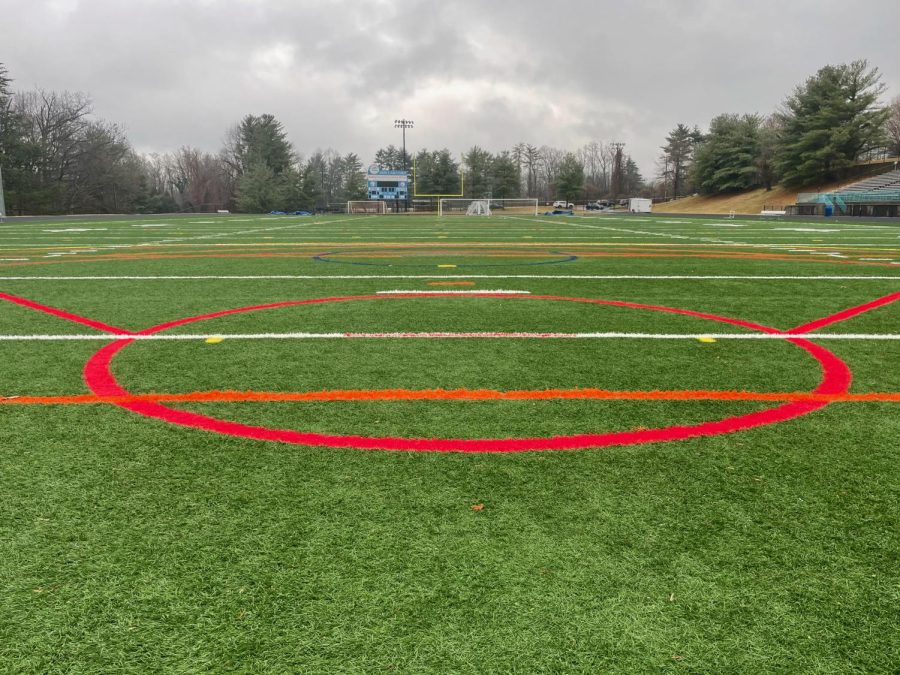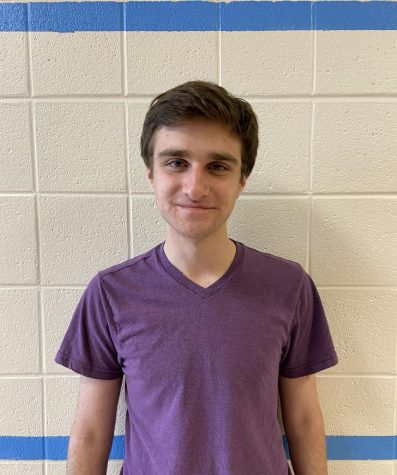MCPS to replace turf infill after discovery of field drainage problems
Whitman’s turf field will undergo repairs, which may interfere with the start of the spring sports season.
February 24, 2022
Whitman’s $1.3 million artificial turf system will undergo repairs to make the surface “playable” for athletes after rain, Principal Robert Dodd wrote in an email to community members on February 10. The project may interfere with the start of the spring sports season.
Dodd wrote in his message that the turf is not draining at the necessary rate after storms. To address the matter, the school district will replace the turf’s zeolite-based infill, ZeoFill, with an engineered wood particle infill called BrockFill, according to the MCPS Division of Construction.
The school system is pursuing this failure as a condition of the turf’s warranty and is working with both the contractor and manufacturer to make necessary repairs, Dodd wrote.
MCPS installed Whitman’s current turf system in 2018. The district contracts with Keystone Sports Construction to conduct regularly scheduled maintenance and upkeep service on the school’s field.
“Even with the required maintenance over the last three years, the turf system has failed,” Dodd wrote. “Our goal continues to be to have the turf field open as soon as possible during the spring season.”
MCPS officials closed Whitman’s turf field in November to determine if repairs to the playing surface were necessary. This forced some fall athletes to play their last regular season games on other high schools’ fields.
Results from tests on the field that MCPS commissioned in 2019 revealed that the amount of friction on the playing surface was lower than the industry standard, making the field “too smooth.”
For field hockey player Carsey Eliason, slipping on the artificial surface is common — and so are the bloody “turf-burns” that come with the falls, she said. In her experience, athletes sometimes hesitate to execute a complex maneuver or change directions quickly, because “turf-burn” injuries often require immediate attention and can leave lasting scars.
“I thought the turf was really dangerous right after it rained or after a lot of practicing on it,” Eliason said. “Sand would also come up into the air and it would be dusty and hard to play, especially when we were playing with masks on last spring.”
Two weeks prior to the field’s closure in November, a goalkeeper on the varsity girls’ soccer team broke her arm after slipping and falling backward on the turf.
MCPS officials’ decision to replace the turf’s ZeoFill infill didn’t surprise former Board of Education member Jill Ortman-Fouse, who was the only official to vote against the installation of ZeoFill on Whitman’s field in 2018. At the time, Ortman-Fouse — along with several community members and health experts — expressed concerns that there may be a lack of sufficient data on the safety and durability of the infill.
“I wish I didn’t have to say, ‘I told you so,’” Ortman-Fouse said. “A lot of advocates like myself have been talking about this for many years.”
In the weeks after the vote to move forward with installing Zeofill on Whitman’s playing surface, a Baltimore private school’s athletic director told The Black & White that their school’s zeolite-based infill had broken down and clogged their field’s drainage system after one year of use.
“[ZeoFill] is like kitty litter, so it creates dust,” Ortman-Fouse said. “It was an unproven technology because it hadn’t been around very long. Why not just go with something that you know has been around for a long time and is safe?”
BrockFill, the infill set to replace ZeoFill, is manufactured by BrockUSA, the same company that manufactured the shock pad for Whitman’s turf system. BrockUSA began selling BrockFill in 2019, and the company claims that the infill drains water nearly nine times faster than industry minimums. The turf manufacturer also maintains that BrockFill is less “abrasive” than other popular turf infills including crumb rubber.
In his community message, Dodd wrote that the school district found that “this new infill has produced exceptional results.”
MCPS has installed BrockFill on both Seneca Valley High School’s and Walter Johnson High School’s playing surfaces, according to the MCPS Division of Construction. Still, some community members feel that MCPS may repeat its previous mistakes by moving forward with the infill replacement.
“I just cannot understand why we are doing it again,” Ortman-Fouse said. “Our students have sustained far too many injuries on artificial turf, and we have spent millions of dollars installing these fields. I don’t know why we continue to make choices that don’t make sense for kids.”










